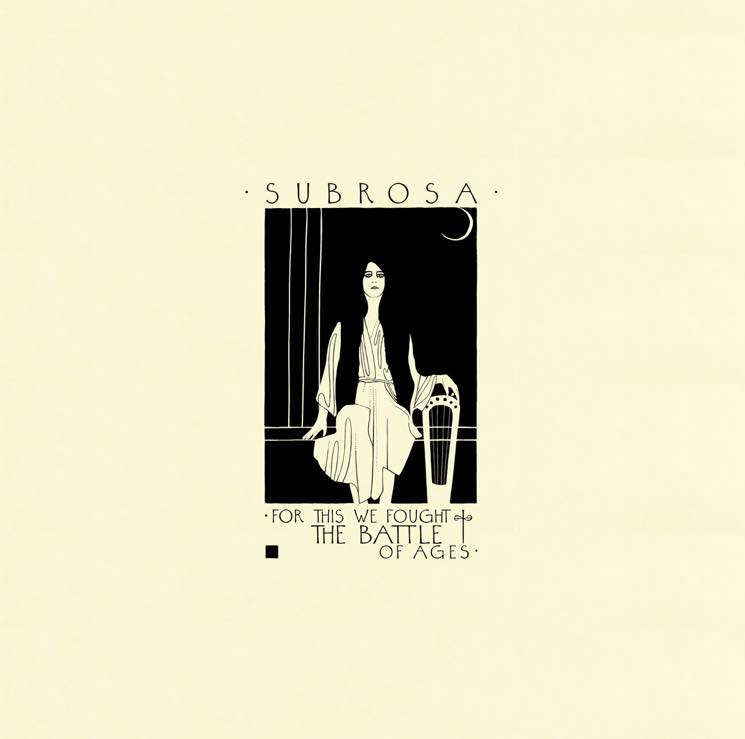SubRosa have crystallized their chamber-infused doom on For This We Fought the Battle of Ages. Having achieved critical acclaim for their last two full-lengths, this fifth LP demonstrates the band's subtle understanding of where they've been and where they need to go next.
The proof is in the strings. While the dual-violin assault has never approached gimmickry, it's also never been as inextricable from the band's sound as it is on The Battle of Ages. One of 2013's More Constant Than the Gods' most praiseworthy aspects was the marked jump from traditional violin playing into that album's effect-laden swamp. Having had their murky fun, Sarah Pendleton and Kim Pack emerge with the confidence and breadth to wring every ounce of emotion out of their instruments.
The rest of the band members do more than pull their respective weight. Principal songwriter Rebecca Vernon proves she is one of the most versatile vocalists in the metal world on "Black Majesty," transitioning seamlessly between pastoral croon, commanding bellow and scornful roar. The guitar playing has lost some of the bite present on previous albums, but Vernon's craft has grown in its implementation of a warmer yet no less devastating style.
One of the more rewarding developments The Battle of Ages has to offer is the production. Handled by drummer Andy Patterson, the album's sound reflects the wide expressive range SubRosa are capable of better than any of their previous releases. The intro bass riff to "Wound of the Warden" would sound menacing on a Yob record, but what's appropriate for SubRosa in this instance is the sombre lens that Patterson helps provide.
Another indication of SubRosa's maturing sound is The Battle of Ages' thematic content. In the past, one got the overwhelming sense that Vernon was mourning some part of herself through her lyrics; this time, she's mourning us. The album sounds less like a funeral dirge and more like the wailing of sirens throughout the streets, reflecting our unease.
Interpreted in this light, the tonal qualities of the album make sense. Personal pain stings, but social tension and disillusionment creeps up in waves, taps you on the back and implores you to accept whatever fate the world has conjured for you. It's downright difficult to listen to "Despair Is a Siren" without recognizing in the violins the same anguish one hears coming from the outside world — should one choose to listen closely enough.
(Profound Lore)The proof is in the strings. While the dual-violin assault has never approached gimmickry, it's also never been as inextricable from the band's sound as it is on The Battle of Ages. One of 2013's More Constant Than the Gods' most praiseworthy aspects was the marked jump from traditional violin playing into that album's effect-laden swamp. Having had their murky fun, Sarah Pendleton and Kim Pack emerge with the confidence and breadth to wring every ounce of emotion out of their instruments.
The rest of the band members do more than pull their respective weight. Principal songwriter Rebecca Vernon proves she is one of the most versatile vocalists in the metal world on "Black Majesty," transitioning seamlessly between pastoral croon, commanding bellow and scornful roar. The guitar playing has lost some of the bite present on previous albums, but Vernon's craft has grown in its implementation of a warmer yet no less devastating style.
One of the more rewarding developments The Battle of Ages has to offer is the production. Handled by drummer Andy Patterson, the album's sound reflects the wide expressive range SubRosa are capable of better than any of their previous releases. The intro bass riff to "Wound of the Warden" would sound menacing on a Yob record, but what's appropriate for SubRosa in this instance is the sombre lens that Patterson helps provide.
Another indication of SubRosa's maturing sound is The Battle of Ages' thematic content. In the past, one got the overwhelming sense that Vernon was mourning some part of herself through her lyrics; this time, she's mourning us. The album sounds less like a funeral dirge and more like the wailing of sirens throughout the streets, reflecting our unease.
Interpreted in this light, the tonal qualities of the album make sense. Personal pain stings, but social tension and disillusionment creeps up in waves, taps you on the back and implores you to accept whatever fate the world has conjured for you. It's downright difficult to listen to "Despair Is a Siren" without recognizing in the violins the same anguish one hears coming from the outside world — should one choose to listen closely enough.
